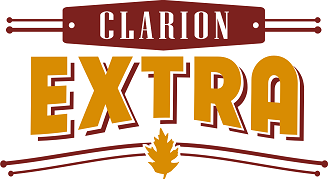Seneca Woodworking in Clarion is using its high-tech equipment with the idea of fulfilling the needs of local health care facilities during the COVID-19 epidemic.
“We wanted to help,” said owner Ryan Wenner, a Cranberry Area High School graduate. “We have a couple of 3D printers and we have a laser cutter, so we thought we could put them to use.”
Wenner said his company recently entered into an agreement with UPMC Northwest to provide the hospital with face shields at “below-market cost.”
Wenner designed the face shield and uses 3D printers to make the adjustable straps for the shield. A laser printer cuts the plastic material for the face shield, which is cut to a pre-programmed standard in a few minutes.
“We have had a 3D printer running 24 hours a day since Ryan came up with this idea,” said office manager Jess Carbaugh, who also is a Clarion Area Elementary School teacher.
Producing one face shield, Carbaugh said, takes about five hours.
“One of the things I learned from talking with people higher up the supply chain is that there are a lot of people out there trying to make respirators and donate them at different places,” Wenner said.
“It’s great that people want to do this, but they really need to ask what the facility actually needs. Post-9/11, the Red Cross received thousands of teddy bears. Many of those teddy bears are still in warehouses because that was not what was needed.”
Wenner heeded that advice. He contacted UPMC Northwest and found it needed face shields.
“They want 200 of them right now,” he said.
Production began Thursday. However, as with many industries today, Wenner is concerned about the supply of raw materials.
“Our biggest concern right now is getting the materials we need to produce the masks,” he said. “The clear shield material is in short supply. I have a lot of contacts with local manufacturers, so we should be OK.”
“We had a lot of help from the community. The Union School District, Clarion Robotics and Redbank Valley School District loaned us the 3D printers. Storage space was donated by Garage-n-Go commercial storage in Clarion.”
In addition to making face shields, Wenner is trying to engineer other solutions to help cope with the shortage of Personal Protection Equipment (PPE).
Wenner believes local businesses could coordinate efforts to ensure certain supplies and equipment are used to the best advantage.
“We are trying to coordinate the effort in our area so that the materials and equipment can be put to the best use,” he said. “The problem is that there is not a lot of central organization for medical supplies.
“There’s a big movement of ‘open-source’ medical supplies right now. For any given item of PPE, respirators, face shields and other items, there are hundreds of designs available to download freely, and right now thousands of people are independently printing these designs at home.”
“Most of these items are a compromise compared to using commercially produced PPE. There’s no commonly accepted standard for many of these items right now; it’s often up to the organizations that uses them to decide what meets their needs.”
Wenner said there are many people with respirators made by 3D-printing, and their hope is to donate them.
“Most health care providers aren’t accepting them, as there can be fit problems with the rigid plastic, and sometimes the 3D-printed parts can be porous and difficult to properly sanitize,” he said.
The “well-intentioned donations,” Wenner said, can cause logistic and administrative complications, as health care providers must deal with an increase in small, unsolicited packages in a time when logistics are more difficult due to extra care taken to prevent the spread of COVID-19.
Wenner said another unintended consequence is unused equipment contributes to a shortage of raw materials that could be purposed to create needed items.
“If you’re making PPE at home, make sure you have a recipient who has approved your design and is willing to use the items,” he said.
Although Seneca Woodworking is now running 3D printers around-the-clock, the company is still looking for help.
Seneca Woodworking is assembling a network for people in the region with the tools and ability to help. Anyone willing to help should go to madeinclarion.org. In addition, the website is designed to be a source for health organizations in search of any PPE.
Wenner said the website will serve to document the project as it moves forward and ultimately will become a resource for manufacturing in the region.

